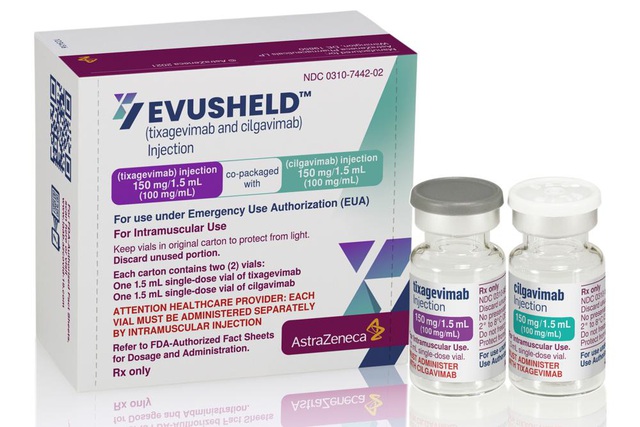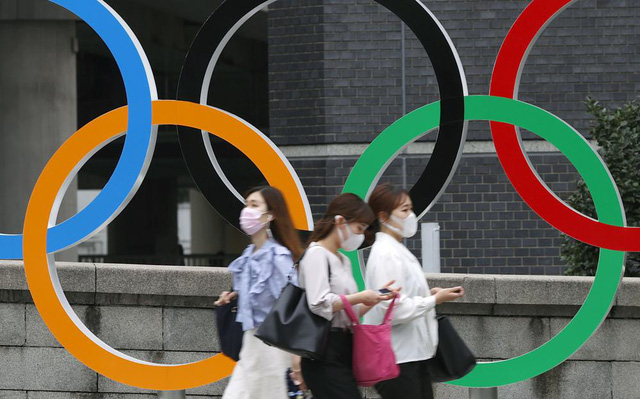Expanding the audience to use drugs to treat COVID-19 Evusheld, the trend of the disease is increasing due to strain BA.2
To date, more than 491.54 million people have contracted COVID-19 globally. (Photo: AP)
America is still the country most severely affected by the epidemic COVID-19 with over 81.83 million cases and more than 1 million deaths. In the past day, the US recorded more than 5,000 people SARS-CoV-2 virus infection.
Vaccination against COVID-19 vaccine made by mRNA technology will have fewer heart complications than being infected with the SARS-CoV-2 virus, this is a study published by the US Centers for Disease Control and Prevention. According to the above study, the risk of cardiac complications after infection with the SARS-CoV-2 virus was significantly higher than the risk after receiving the mRNA vaccine regardless of whether it was the first, second or booster dose. across all age and sex groups. The results of this study have once again supported the vaccination of all people aged 5 years and older with a COVID-19 vaccine prepared by mRNA technology.
At the world’s second largest COVID-19 epidemic center Indiaon April 3, the country recorded a total of over 43.02 million people with COVID-19, including more than 521,300 deaths from COVID-19 in this South Asian country.
Brazil is currently the world’s third largest epidemic hotspot with nearly 660,200 COVID-19 patients not dying out of a total of over 29.99 million infected people in this country.
The Brazilian government has decided to relax restrictions on international visitors to the country. Accordingly, Brazil will stop requiring visitors to enter the country to submit a negative PCR test for the SARS-CoV-2 virus as well as make a full medical declaration. However, visitors need to have a certificate that they have had enough doses of the COVID-19 vaccine.
The Brazilian Ministry of Health has officially approved the use of Baricitinib, an anti-inflammatory drug used in tablet form, in the treatment of acute respiratory infections COVID-19 in the country. Baricitinib is the first drug used to treat COVID-19 in the Unified Health System (SUS) directly operated by the Government of Brazil.
The Brazilian Ministry of Health said that the drug Baricitinib will be used to treat elderly patients or patients with COVID-19 who are on ventilators from April 1.

Europe has expanded the audience to use the drug Evosheld. (Photo: AP)
Drug Administration Europe has just expanded the allowed users to use the monoclonal anti-coronavirus Evusheld antibody produced by the pharmaceutical company AstraZeneca. Subjects of use are people over 12 years old and weighing 40 kg or more, regardless of the medical condition or not.
This authorization decision of the European Commission is based on the recommendation of use from the Provent clinical study, the world’s leading research reputation. This opens up opportunities to be protected for more groups of people, especially those at high risk of infection and at high risk of severe disease and death such as the elderly, people with underlying diseases, people who are frequently exposed to the virus. contact with many people or perform essential services, anti-epidemic work. Currently, Evusheld has been licensed urgently in more than 20 countries around the world, including Vietnam.
The easing of epidemic prevention regulations is being accelerated by many countries to soon return to normal life. In Europe, a growing number of countries are lifting all travel restrictions, while in Brazil, the requirement to test travelers who have been vaccinated.
Ireland, Denmark and Norway begin to lift all travel restrictions. These countries do not require certification of vaccinations, tests or confirmation of disease status, and most do not even require the wearing of masks.
In Central Europe tourists can travel freely due to countries such as the Czech Republic, Poland, Slovakia and Hungary thanks to the abolition of entry restrictions. Wearing a mask is only mandatory in hospitals and medical facilities.
Cuba has officially submitted an application for approval of the COVID-19 vaccine Abdala researched and developed by this country with the World Health Organization. Abdala vaccine is produced by BioCubaFarma Pharmaceutical and Biotechnology Corporation of Cuba.
Up to now, more than 8 million Cubans have been vaccinated against COVID-19 with the above vaccine. In addition, Cuba also exports Abdala vaccine to a number of countries such as Venezuela, Nicaragua, Iran, Mexico and Vietnam. In addition to the Abdala vaccine, Cuba is also considering to soon present the results of clinical studies of two other COVID-19 vaccine candidates, Soberana 01 and Mambisa.
Cuba is considered a bright spot in Latin America’s vaccine in the context that this region is still the epicenter of the global COVID-19 pandemic. This is the only Latin American country that produces its own vaccine against COVID-19.
Dr. Ridhwaan Suliman of the Council of Science and Technology Research (CSIR) of South Africa The new variant Deltacron (a combination of Delta and Omicron variants) has appeared in South Africa and may cause the 5th wave of COVID-19 epidemics in late April or May in this country. “There is no indication that the Deltacron variant is more severe or fatal than the Omicron variant,” said Dr. Ridhwaan Suliman. According to him, this variant has prevailed in the country and became popular only after the Omicron variant, which caused the fourth wave of epidemics in South Africa.
Despite the predicted fifth wave, President Cyril Ramaphosa has relaxed restrictions on the COVID-19 epidemic, based on the evidence of scientists that about 60% to 80% of people The people of this country are immune to the SARS-CoV-2 virus.

Japan faces an increase in the number of new COVID-19 cases. (Photo: AP)
Analysis of the genetic sequence of a patient sample taken from a COVID-19 patient in Thailand shows, variant XE of the SARS CoV-2 virus appeared in this country, not long after the warning of the World Health Organization (WHO). XE is believed to be a hybrid between two sub-variants of Omicron, BA.1 and BA.2, which currently account for a small percentage of COVID-19 cases globally. Thailand is monitoring the risk of infection of this variant.
According to data reported by the Government Japan Regarding the COVID-19 epidemic situation on April 2, the country is seeing a return of new infections in most localities. Meanwhile, Japanese medical experts warn that the country is facing a new wave of epidemics.
The latest report of the Japanese Government said that in less than 2 weeks after Japan lifted emergency epidemic response measures along with other restrictive measures, in the past week, the number of cases COVID-19 has increased in 44 of the country’s 47 provinces. On April 2, Japan recorded 48,825 new cases, an increase of 1,500 cases compared to the previous week due to the strong spread of Omicron’s “stealth variant” BA.2. Meanwhile, on April 3, Japan had 47,377 new infections.
Not only Japan, the trend of the epidemic increased in many countries because BA.2 became the main infectious variant right at the time when countries loosened anti-epidemic measures.
The situation of COVID-19 epidemic is developing complicatedly in China. On April 2, the country recorded more than 13,000 new cases of COVID-19, the highest level since the first peak of the COVID-19 epidemic two years ago. The current wave of epidemics in China is caused by the rapid spread of the Omicron variant in dozens of provinces.
Shanghai, the largest city in the country is facing the strongest outbreak ever. In order to prevent the spread of the virus, on April 3, the city conducted a rapid test for COVID-19 across the city and will do a PCR test on April 4. These measures aim to completely eliminate potential risks, cut off the chain of transmission, limit the spread of the virus, and achieve the goal of “Zero COVID” as soon as possible.
Meanwhile, the Chief of the Special Administrative Region Hong Kong (China), Mrs. Lam Trinh Nguyet Nga (Carrie Lam) invited all people living in Hong Kong to take a quick test for COVID-19 in a 3-day period from April 8 to 10. Speaking at a press conference, Ms. Lam said that this voluntary test is not a replacement for the previous plan for city-wide testing, but to assess the situation of infection and spread of the virus. determine the best time for mass testing.
The Hong Kong government has begun distributing epidemic prevention support bags, each containing 20 rapid test kits, to households. Ms. Lam Trinh Nguyet Nga urged everyone to do a quick test and report the results within 24 hours if positive.
* Invite readers to watch programs broadcast by Vietnam Television on TV Online and VTVGo!
at Blogtuan.info – Source: vtv.vn – Read the original article here



